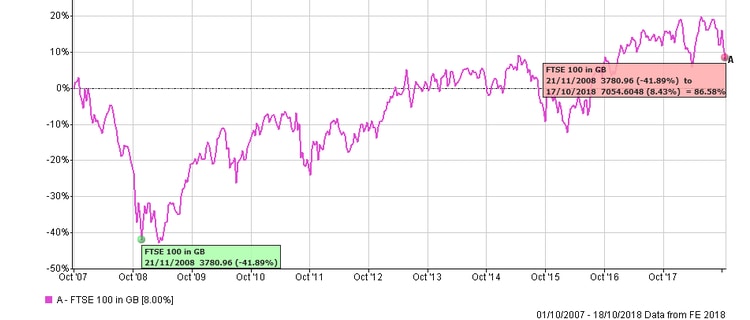
It’s been 10 years since the financial world was shaken. 10 years since the Government became Royal Bank Scotland’s (RBS) majority shareholder, bailing the bank out from certain collapse. The financial crisis in 2008, sparked by sub-prime mortgage lending in the US, is widely considered to be the worst financial crash since the Great Depression of the 1930s.
But what has happened since?
Markets have risen quite significantly. In fact, we’ve experienced a 10 year bull run. But, is the bubble ready to burst again? It’s a common opinion that to truly comprehend risk and financial loss you need to experience it, but do some people have a short-term memory? It may be easy to become complacent given the investment returns we have witnessed.
The reality is that market fluctuations are not consigned to the history books. Time has shown it is inevitable, and at present volatility is quite widely predicted. The level of global economic expansion has left equities, bonds and other investment assets highly priced. A short-term drop could be inevitable. Compounding the issue is the uncertainty of Brexit.
What can you do?
Above all, being realistic, understanding volatility and preparing for it is key. As financial planners, we are here to help you plan appropriately.
Absolutely avoid making rash, reactive decisions, as they may leave you vulnerable. During volatility, scammers are likely to prey on uncertainty. In 2017, during a prosperous year of investment growth, the FCA reported 1.3 million claims of mis-sold pensions and investments. That’s 13% of all people who received regulated advice that year. At all costs, avoid becoming one of these statistics at a time when well-educated decisions can help mitigate any losses.
Time in the market
The temptation might be to sell your investments and sit in cash. But, remember why you are investing in the first place; it’s likely to be towards your retirement, which is a long-term objective requiring long-term investment. It’s almost inevitable you’ll experience volatility in this time, but history has proved markets do recover and bounce back. A panic-fuelled withdrawal when markets drop is very counterproductive, you would effectively be ‘locking in’ any loss.
Furthermore, analysis from AJ Bell found that pension investors are hoping for annual returns of 4.8% to support the level of income they’d like in retirement. Cash simply won’t be able to achieve this. In fact, over time the effect of inflation will erode your buying power.
Time in the market, not withdrawing your investment and attempting to time it, remains as important as ever. Fundamentally, trying to guess the market and knowing when to sell and reinvestment is virtually impossible.
Exploit volatility
When stock and share prices fall, assuming you are not intending to retire in the short-term, making additional contributions could actually be the best thing to do. Of course, this does depend on your personal circumstances, risk tolerance and affordability.
With any portfolio, be it your pension, general investment account or ISA, the level of risk you are willing to take must be carefully measured and regularly reviewed. A sensibly managed portfolio with help from your financial planner is the best way to mitigate volatility and risk.
In truth, nobody can accurately predict the future. Investment professionals may be speculating a level of volatility, but how much and exactly when are unknown. The best thing we can do is plan for likely eventualities. In all circumstances, not just after a 10 year bull run, it’s important to;
- Not make rash decisions
- Be realistic with your expectations, and
- Keep in regular contact with your financial planner
Your financial plan
We are here to help secure your financial future. If you are concerned about the returns of your pension or investments, or what to do in times of inevitable volatility, please get in touch. Sticking to your long-term financial plan remains as relevant as ever. You must try to embrace and exploit volatility, rather than making detrimental decisions. Confidence is key. We may not be able to predict the future, but we can help you plan for it.
